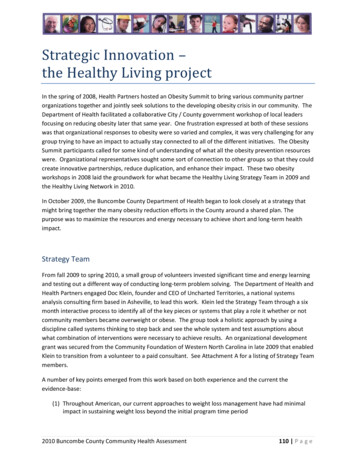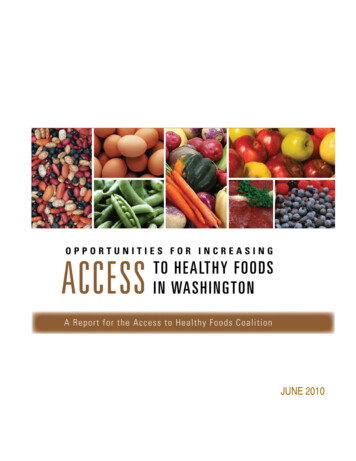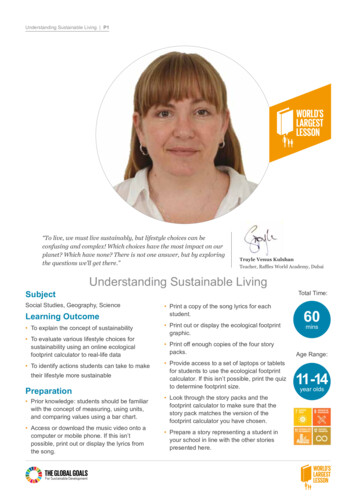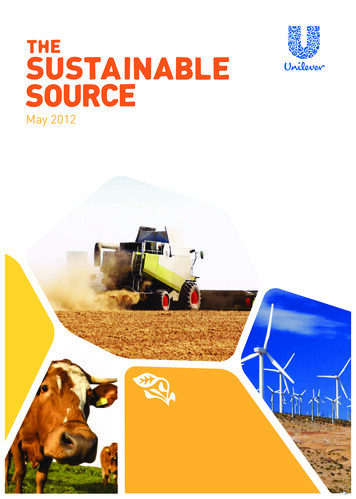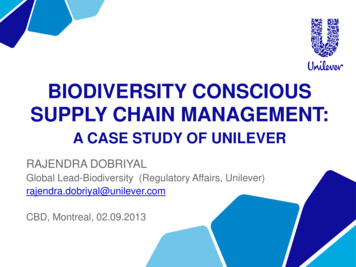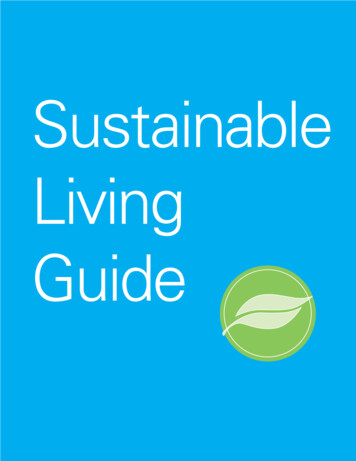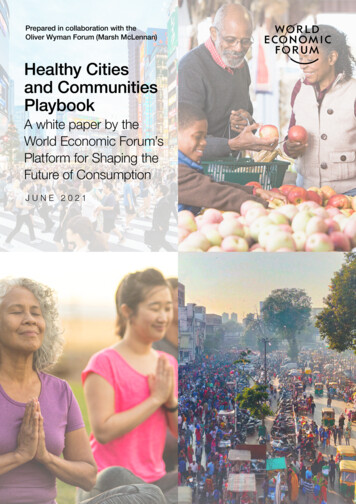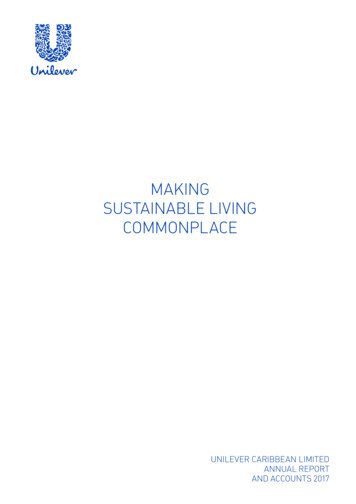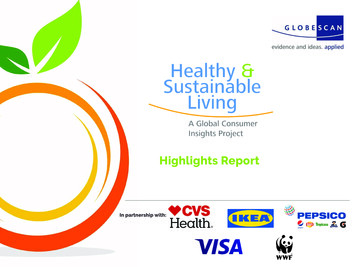
Transcription
Highlights ReportIn partnership with:
2INTRODUCTIONDespite the pandemic, the evidence from the2020 Healthy & Sustainable Living Survey showsthat consumers around the world are willing tochange their behavior to become healthier andmore sustainable. However, they need supportand guidance to follow through, and easy andaffordable solutions are essential. Enablingconsumers to live more healthy and sustainablelives is not only crucial for our collective future,but also presents a great opportunity for brands tobuild more trust, loyalty and advocacy amongconsumers.GlobeScan’s Healthy & Sustainable LivingSurvey was launched in 2019 to help companiesbetter understand, engage, and mobilizeconsumers in this important yet challenging areaof healthy and sustainable living. The researchprogram builds on 20 years of GlobeScan’s publicopinion and consumer research in the areas ofsustainability, branding, and reputation, and isdesigned to help organizations better understandthe diverse mindsets of consumers that shapetheir barriers to, and enablers of, more healthy andsustainable living .Participating Markets2020 Representative online samples of approximately 1,000 adults per market in each of 27 markets (n 27,000) Samples representative of online population, weighted to reflect general population census data Online surveying in June 2020 Where historical data are shown, questions were asked using an in-person and telephone methodology before 2019.* To make this concept as accessible to people as possible, respondents were not asked directly about healthy and sustainable living,but instead about being healthy, environmentally friendly, and helpful to others.
KEY INSIGHTS3Across 27 markets, the Healthy & Sustainable Living study finds that people are eager to look after themselves and theplanet. Although there is appetite to change lifestyles and behaviors, people need support in order to follow throughwith these changes. The findings highlight a variety of ways that organizations can engage consumers and enable theuptake of more healthy and sustainable behaviors. Key findings include:1. The environment still matters: Despite the pandemic,concern and engagement around environmental issuesremain high on people’s agendas. Climate change and thedepletion of natural resources are as important as ever toconsumers and there is a demand for systemic solutions tothese challenges.2. A desire to change how we live: Consumers express asignificant interest in changing their lifestyles in ways thatalign with health and sustainability yet find these shiftsdifficult to achieve. There are opportunities for organizationsto step in to remove obstacles and enable consumers livebetter.3. Easy is good: Clear guidance and accessible options willfacilitate healthy and sustainable living as people areunlikely to embrace change if they think it is difficult. Whentrying to be healthier and more sustainable, the easiersomething is perceived to be, the more interested peopleare in changing that behavior.4. Accessibility to healthy and sustainable living is a priority:In the context of a global recession, behavior change needsto be affordable. While consumers want to become healthierand adopt more sustainable behaviors, they are also keen toprioritize their financial health in the coming year. Consumerswant companies to offer more affordable products andservices that facilitate healthy and sustainable behaviors.5. Gen Z are highly engaged: There is a strong generationaldivide around healthy and sustainable living. Mostconsumers, no matter what age, want to improve their healthand reduce their negative impacts on the environment.However, Gen Z are the most open to change and are themost likely to feel guilty about their behavior. Baby Boomersand older are the least environmentally conscious cohort.
INSIGHT 1. CONCERN FOR THE ENVIRONMENT REMAINS HIGH AMID GLOBAL PANDEMICHealth issues are top of mind, but the concern about theenvironment is not far behind.With its impacts felt across the globe, it is not surprising that people view thenovel coronavirus as the most serious global problem among more than adozen issues tested. People are also increasingly worried about issues relatedto the pandemic, such as the spread of human diseases and the state of theglobal economy.Nevertheless, concern for the environment has not diminished. AfterCOVID-19, people feel that the depletion of natural resources and climatechange are the next most serious global issues. People increasingly wantto reduce their personal impact on the environment and also continue toacknowledge a need to consume less to ensure the preservation of the planetfor generations to come.Attitudes around the environment have intensifiedand there is appetite to do more to protect it. Aseconomies rebuild post-pandemic, it is likely wewill see a demand for a green recovery.Seriousness of Global Problemss“Very Serious,” Average of 27 Markets, 2020In addition, an increasing proportion of people globally are feeling a sense ofguilt over their own environmental impact, with more than half now saying thatthey feel guilty about their negative impact.Environmental Attitudes“Strongly Agree” and “Somewhat Agree,” Average of 24 Markets,* 2019–2020“The earth is getting hotter. The climate iserratic. And we bear the consequences.”(Millennial, Vietnam)“Climate change and the impact of pollution is ruining our planet,it is making it a worse place and in recent years I have gainedthe awareness that my daughters, grandchildren, and futuregenerations want to leave a cleaner planet.”(Millennial, Italy)4
INSIGHT 2. HELP IS NEEDED TO ENABLE HEALTHY AND SUSTAINABLE LIVINGPeople want to live healthy and sustainable lives but arenot doing as much as they would like.People across the world are looking to make changes to their lives tobecome healthier, more environmentally friendly, and more helpful toothers. Reflecting the importance placed on health this year, becominghealthier is the area that people would like to change the most (61%want to change this aspect of their life “a great deal”). Even so, this isnot at the expense of the environment – 50 percent of people say theywould like to make many changes to become more environmentallyfriendly.Desire to Change vs Changes Made to LifestyleAverage of 27 Markets, 2020People are searching for information to help them live healthier (56%)and more environmentally friendly (47%) lives – Gen Zs and Millennialsare even more likely to be looking for answers. However, few arefollowing through by turning these aspirations into actual changesto their behavior. This suggests that people are struggling and needsupport and guidance.“I am convinced that if we do not change our lifestyles and habits,we will destroy our natural resources.”(Millennial, Mexico)“I am interested in contributing to improving the quality of life, andalso leaving a healthy planet for the next generations.”(Millennial, Argentina)“Everyone has individual responsibility for the future of the earthand you always have to start with yourself.”(Gen Z, Germany)Opportunities and advice from influential actorssuch as government, business, and NGOs couldencourage and enable people to lead better livesfor themselves and for the planet.5
6INSIGHT 3. BEHAVIOR CHANGE NEEDS TO BE EASYConsumers most want to make changes that will benefit boththemselves and the environment.When trying to be healthier and more sustainable, people are most likelyto alter aspects of their life if they perceive it to be relatively easy to doso. This typically includes actions related to improving personal wellbeing(e.g., spending more time with friends/family), changes in the household(e.g., saving water at home), and ethical purchasing (e.g., choosingproducts with less packaging and buying from responsible brands).Lifestyle changes that involve sharing with others, buying second hand,or traveling responsibly are relatively less desirable at this moment intime – perhaps unsurprisingly due to the ongoing COVID-19 pandemic.Post-pandemic, it is likely that consumers will become more interested inthese activities.Incorporating new technology into their lives, such as generatingrenewable energy or using electric cars, is also perceived to be achallenge. Consumers also believe new business models such as rentingfurniture or taking reusable containers to stores are relatively difficult toengage in. To encourage uptake, companies have an opportunity to makeprocesses simple and accessible for consumers, with clear informationand guidance.There are a few relatively difficult lifestyle changes that consumers areinterested in doing more – including improving financial health, buyingproducts certified as responsible, and repairing products rather thandiscarding them. These are areas where companies can offer long-termsolutions and guidance.“When buying goods, I began to pay attentionto what the packaging was made of. Finally,I began sorting the garbage and throwingaway the waste separately. I installed afood chopper in the kitchen. I use moreenvironmentally friendly fuel for my car.”(Gen X, Russia)“I have moderated my consumption ofdisposables, trying to use as little single-usematerial as possible.”(Gen Z, Mexico)“I am recycling a lot but am struggling withdrop-off points and our local municipality tocollect plastic, cans, and bottles. We only havea few glass bottle bins around town.”(Baby Boomer, South Africa)People are unlikely to embrace change ifthey think it is difficult. They need proofthat embracing change does not have to becomplicated – providing opportunities fororganizations to engage and enable.Desire vs Difficulty to Change BehaviorsAverage of 27 Markets, 2020
INSIGHT 4. HEALTHY AND SUSTAINABLE LIVING MUST BE AFFORDABLEConsumers are asking for cost-effective solutions forbehavior change.When asked what companies could do to help them live healthily andsustainably, consumers most often point to affordable products and services.This is consistent across almost all markets and across all generations. Whilemany claim they would be willing to pay more for environmentally and sociallyresponsible brands, especially younger generations, only around one-third ofconsumers say they have rewarded a responsible company in the past year.This proportion has remained steady over the last two decades. While theproportion saying they have considered rewarding responsible companies isincreasing, there is a need to convert this inclination to actual behavior changeby making responsible products and services more affordable.Reinforcing the importance of price, taking care of personal financial healthis also the top action consumers would like to do more of in the coming year.With changes to income and financial stability in the wake of the pandemic,affordability is a high priority.Preferred Company Actions to Help People and the EnvironmentAverage of 27 Markets, 2020Consumers are often considering moreresponsible offerings by companies but needlower price points to convert their intentions toactual behavior change.Rewarding Responsible CompaniesAverage of 16 Markets,* 1999–20207
INSIGHT 5. YOUNG PEOPLE ARE MOST OPEN TO CHANGING THEIR BEHAVIORSYounger generations are far more interested in changing theirbehaviors and are more commonly subjected to social pressureto do so.Younger generations express significantly more interest in becoming healthier,more environmentally friendly, and being more helpful to others than thosebelonging to Generation X, Baby Boomers, and older. Around seven in ten GenZ and Millennial consumers say they would like to change their lifestyle “a greatdeal” to become healthier, and more than half would like to do the same tobecome more sustainable and more altruistic.These same generations are also more likely than older generations toclaim they have made major changes to live in ways that are healthier, moreenvironmentally friendly, and more helpful to others, although a large gapremains in all three areas between the desire to change and actions taken.Environmental Attitudes“Strongly Agree” and “Somewhat Agree,” Average of 27 Markets,by Generation, 2020“Because we live in nature, we need toprotect it and protect it together, which is alsobeneficial to physical and mental health.”“A healthy life begins with a healthyenvironment. A healthy environment beginswith an individual. And I am that individual.”(Gen Z, China)(Gen Z, Nigeria)8Perhaps being conscious of this gap, Gen Z and Millennials are the most self-critical.They believe they have the capacity to do more than what they are currently doingand are most likely to feel guilt and shame about their impact on the environment.They are also more likely to believe that what is good for them may not be good forthe environment.Younger generations are also most often subjected to social pressure to becomeboth healthier and more sustainable. Consumers belonging to these generations aremuch more likely than those who are older to say that they have been encouraged byfriends or family to change their behavior, or that they have been inspired by an onlineinfluencer or celebrity to do so.Social Pressures to Be Healthier and More Environmentally FriendlyAverage of 27 Markets, Done/Experienced over Past Year, by Generation, 2020
9APPENDIX: MAPPING DESIRE TO CHANGEThe desire to change behaviors to become healthier andmore sustainable differs across the markets surveyed,with people in emerging markets generally expressing astronger will to change.HSL Behavior Change IndexBy Market, 2020To portray the current desire to change behaviors for morehealthy and sustainable lifestyles and how it varies aroundthe world, GlobeScan developed a Behavior Change Indexand examined it geographically.Consumers were asked about their desire to change indifferent areas related to healthy and sustainable living, witheach individual respondent’s index score then calculatedbased on how many healthy and sustainable behaviorsconsumers want to do more of.The map shows the relative strength of self-reporteddesire to change healthy and sustainable living behavioras summarized by the index calculation. It portrays wherepeople are currently most wanting to adopt more healthyand sustainable lifestyles. Behavior patterns are affectedby factors such as economic development, availableinfrastructure, consumer preferences, and culturaldimensions.People in less developed markets tend to be more eagerto do more behaviors that are healthy and sustainable,reflecting generally higher levels of concern about theenvironment and more widespread feelings of personalguilt about one’s own impact compared to more developedmarkets. In contrast, people in places like Japan, Sweden, orAustralia are among the least open to doing more healthyand sustainable behaviors.“I pay more attention to recycling and I am trying to getmore recyclable things. I never get more than I need.”“Eat healthier, include veggies and fruits. Recycle and reuseitems if possible. Use less water. Exercise more regularly.”(Gen Z, Turkey)(Gen Z, Singapore)“I have tried to stop eating meat. I choose not to use bags or plastics and I go to places where they promote environmentalconsciousness. I don’t buy products made from animals, like fur. I recycle, compost with residues of fruits and vegetables.”(Millennial, Argentina)
10METHODOLOGYThe design of this online, 27-market study(n 27,000 weighted) was led by GlobeScan’s seniorteam and informed through consultation withparticipating design partner organizations. Thesurvey design supports year-over-year tracking ofemerging attitudes and consumer behavior in thearea of healthy and sustainable living.GlobeScan administered the 20-minute onlinesurvey in June 2020 to approximately 1,000adults per market in each of 27 markets. Thesurvey was conducted in native languages. InIndia, Kenya, Nigeria, and South Africa, the surveywas conducted in English.Using stratified sampling from non-probabilitybut managed online panels, samples arerepresentative of the online population andweighted to the latest census data to benationally representative. In some developingmarkets, the ability to weight to be nationallyrepresentative is limited by the extent of internetpenetration (e.g., Kenya, Nigeria, Saudi Arabia,and Vietnam).As in all cross-cultural surveys, the comparabilityof results across markets is affected by culturalresponse bias (different cultures tend to vary interms of being more or less likely to agree, or toaward extreme scores on either end of the scale).Per best practice in cross-cultural market researchand public opinion research, data have not beenstandardized in order to preserve differentiation.In some cases, data are best interpreted by rankorder findings among markets.Where historical data are shown, before 2019questions were asked as part of GlobeScan’sRadar research programme using in-person andtelephone modes. As the research methodologywas different, comparisons between current andprevious results are indicative.Respondents were not asked directly abouthealthy and sustainable living, but instead aboutbeing healthy, environmentally friendly, andhelpful to others.
11BUILDING TRUSTED LEADERSHIPTO CREATE A BETTER FUTUREGlobeScan is an insights and strategy firm that helpscompanies, NGOs, and governmental organizationsbuild the trust they need to create enduring value forthemselves and for society.www.globescan.com
affordable solutions are essential. Enabling consumers to live more healthy and sustainable lives is not only crucial for our collective future, but also presents a great opportunity for brands to build more trust, loyalty and advocacy among consumers. GlobeScan’s Healthy & Sustainable Livi

